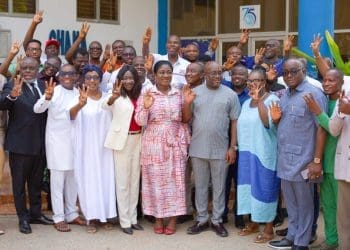Former President Nana Addo Dankwa Akufo-Addo has paid a deeply personal tribute to Ghanaian highlife legend Charles Kwadwo Fosu, popularly known as Daddy Lumba, describing him as a “dear friend” and “a pantheon among musical greats of all time.”
In a Facebook post published shortly after the news broke, Mr Akufo-Addo said he had received with regret the “sad news” of the passing of the acclaimed musician, whose career spanned more than four decades and produced over 200 songs across 33 albums.
“Daddy Lumba had a special connection with his fans and the entire nation,” he wrote. “His hit-making songs will remain lasting contributions to my presidential journey and will forever be etched in the annals of the political campaign of the New Patriotic Party (NPP).
He will be sorely missed.”
Ending his message with a solemn prayer, the former President added: “May he peacefully rest in the Bosom of the Almighty until the Last Day of the Resurrection, when we shall all meet again.”
National loss confirmed by family and DL FM
The family of Daddy Lumba officially announced his death on Saturday, July 26, 2025, in a statement that requested privacy as they mourn the beloved artist.
No details about the cause of death were disclosed, and funeral arrangements, according to the family, will be communicated in the coming days.
A statement issued by the management of DL FM, the radio station founded by the late musician, described his passing as a monumental loss to the nation and the arts.
“Daddy Lumba was more than a musician; he was a cultural icon whose music touched countless lives,” the statement said.
“His soulful voice provided the soundtrack to our love stories, and his poignant lyrics captured the poetry of our struggles, dreams, and resilience.”
Four decades of dominance and duality
Born Charles Kwadwo Fosu, Daddy Lumba rose from modest beginnings to become one of Ghana’s most prolific and celebrated musicians.
With a career that began in the 1980s and blossomed with his debut solo album in 1989, Lumba quickly established himself as a powerful creative force in Ghana’s highlife music scene.
Over more than 40 years, Lumba released 33 albums, weaving together romantic ballads, spiritual confessions, and biting social commentary in a style unmistakably his own.
He was a master of melody and metaphor, whose music mirrored the contradictions and complexities of everyday Ghanaian life.
The controversial genius
While fans and critics often praise Daddy Lumba’s consistency, it was his unpredictability that made him an enduring and fascinating figure.
He often oscillated between deep spirituality and daring sensuality, releasing gospel albums that praised Jesus one year and following up with provocative songs and music videos the next.
This creative duality, simultaneously reverent and rebellious, earned him both passionate followers and fierce detractors.
Political and cultural impact
Daddy Lumba was not just a musician—he was a cultural institution.
His influence extended beyond the studio and stage into the political realm.
Several of his songs were used prominently during political campaigns, particularly by the New Patriotic Party, of which he was a vocal supporter.
His songs like Nana Winner became unofficial campaign anthems for Akufo-Addo’s presidential bids, helping to rally support and energise the party’s base.
Akufo-Addo’s tribute highlights this unique intersection of music and politics, where Lumba’s artistry contributed to shaping a national political narrative.
A legacy etched in sound
Beyond his solo career, Lumba mentored and collaborated with several Ghanaian musicians, including Ofori Amponsah, Borax, and Nana Acheampong, helping to shape the next generation of highlife stars. His work transcended time and trend, remaining relevant to both older and younger audiences.
Each album told a new story, each collaboration revealed another layer of his artistry, and each lyric added to the vast archive of Ghana’s musical heritage.
As Ghana mourns one of its finest sons, many are reflecting not just on the loss of a musical genius but on the departure of a cultural historian who chronicled love, loss, faith, and the Ghanaian experience through song.
Final notes
Daddy Lumba’s music lives on—in homes, on radio airwaves, in roadside bars, in the memories of fans, and in the soul of a nation that found its stories in his voice.
The tributes will continue to pour in. The nation will grieve. But the legend of Charles Kwadwo Fosu, Daddy Lumba, is forever.














